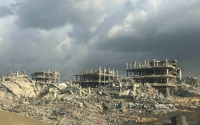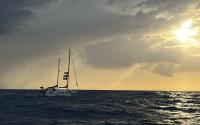27 May 2007The Guardian
It was at Sundance, Robert Redford's film festival held in the Utah mountains, that Black Gold became more than just another angry film. Nick and Marc Francis, the British brothers who made the low-budget documentary about the global coffee trade, were asked by a sell-out audience how much it would cost to help farmers finish building a school they had filmed in Ethiopia. The answer was $10,000. An audience member raised his hand and pledged to donate the full amount. He wrote a cheque on the spot.
Black Gold is galvanising audiences wherever it plays. The Francis brothers receive hundreds of emails a day from people in the coffee industry who, appalled by images of women in factories handpicking coffee beans for wages of half a dollar a day, want to change the way they do business. Employees of the multinationals which dominate the £40bn-a-year coffee industry - the world's second most valuable after crude oil - have told the brothers they had no idea they were perpetuating such a system.
Marc said: 'At the end of the day, every cup of coffee we drink relies on exploitation.' It is not a message the coffee giants wish to gain currency. Starbucks reportedly sent an email to its employees in Britain describing Black Gold as 'inaccurate and incomplete' before it was screened at the London Film Festival. At Sundance, the company distributed a statement saying that it thinks 'coffee farmers should make a living wage and be paid fair prices', and invited the Francis brothers to its headquarters in Seattle, having previously refused to grant them an interview.
Black Gold - which cost £325,000 to make - has made waves at film festivals in Melbourne, Rio de Janeiro, Rome and all over America. It was shown to MPs at Westminster earlier this year. Next Saturday, the Francis brothers are to speak at a preview screening at the Guardian Hay Festival in Hay-on-Wye, and the film goes on general release the following week. Nick said: 'We want to make people think about what's at the bottom of the coffee cup, and that has set alarm bells ringing in the big companies. Questions are being asked about how they can talk a lot about corporate responsibility yet not pay coffee farmers a decent price. We've had shareholders and employees of those companies writing to us saying, "We didn't know this." One worker in Starbucks said he was never going to serve latte in the same way again.'
The film represents a career breakthrough for Londoners Nick, 28, and 31-year-old Marc, who directed and produced Black Gold. They set up the production company Speak-it Films in 2002 and have focused on social and human rights issues. 'Black Gold came about when we learnt that Ethiopia was facing another famine, but also because it was the 20th anniversary of the Live Aid concert,' Marc said. 'Being brought up in a generation surrounded by images of barren landscapes and starving children, we were always told to give food aid and the problem will be solved. We wanted to present another angle here: how can it be there is famine in Ethiopia and yet there is a booming coffee trade on its doorstep?'
Black Gold tells the story of Tadesse Meskela, manager of the Oromia Coffee Farmers Co-operative Union in Ethiopia, the birthplace of the plant now cultivated in more than 50 countries. Meskela goes on a mission to save the 74,000 struggling coffee farmers in the co-operative from bankruptcy, attempting to beat the system by finding buyers willing to pay a fair price for high quality. The film follows his journey to London and Seattle and portrays him as a David against the Goliath corporations, New York commodity traders, international coffee exchanges and the World Trade Organisation. He has subsequently put his case to Tony Blair at Downing Street.
There are few products of capitalism more pertinent than coffee, the world's most popular drink, with more than two billion cups drunk every day. And there are few products more economically complex. The final price of a cup of coffee in the West will have absorbed the costs of insurance, taxes, transport, processing, packaging, marketing, storage and much more. But of the £2 charged for a cappuccino in a British coffee shop, an average farmer gets less than 2p.
'Coffee is one of the least transparent industries in the world,' said Nick. 'We're supposed to be marking 200 years since the abolition of slavery. The coffee industry is not slavery, but when people are being paid half a dollar a day it is not far off. The companies argue that it's better than nothing, and that's a problem. By which standard is an equitable wage being judged? The companies who supply us with coffee wouldn't treat their own employees the same way.
'The whole debate about sustainability has been hijacked by Starbucks. When they talk about their programmes for employees - for example, healthcare - they don't talk about farmers as part of their workforce. You go to a shop and see pictures of happy, smiley coffee farmers, but we need to go back to the value chain and ask how much of the $3 cappuccino or latte goes to the farmer?'
Amid the praise for the film, there are voices of dissent. Some experts say the film's thesis is too simplistic, not least in its juxtaposition of emotive images of struggling Africans with clips of overweight latte drinkers.
Mark Pendergrast, author of Uncommon Grounds: The History of Coffee and How It Transformed Our World, said: 'Black Gold is very good in terms of raising issues, but it's a very unfair film because the implication is that Starbucks is starving people in Ethiopia. That's a very black-and-white way of looking at an issue with many shades of grey. Starbucks have one of the best sustainable practices in the world, although they do a bad job of communicating it. Yes, they could do more, but if you want to pick a bad guy in coffee, Starbucks is not it.'
The Francis brothers deny they set out to demonise the high street chain. Nick said: 'We don't see our film as a Super Size Me, running around trying to bash Starbucks. It's a shame the attention got drawn to them when it should be on Kraft, Nestlé, Proctor & Gamble and Sara Lee, but their logos are not everywhere, whereas Starbucks draw attention to themselves. Essentially the market is dominated by these four companies, who set the price, then it gets chipped away and penalises people at the end of the chain. Yes, it's a problem of the system, but it's not helped by the big corporations - they have a massive responsibility.' Marc said: 'These companies [in the coffee business] have more revenue than a lot of African nations. They make billions from coffee, while the very people who prop up their billion-dollar empires are struggling to survive.'
But Pendergrast argues that the chain of supply and demand is complicated and that it is facile to portray the big companies as caricatures of greed. The exploitation of coffee farmers is not, he argues, a straightforward whodunnit. 'If you follow where the money goes, it's very difficult to say this is the bad guy, he's making all the money,' he said. 'You can't really say it's the evil importer, evil exporter, evil roaster - they all make a little money along the way. I would like to see the big four pressured, but they're also locked in: they have to please their shareholders and they're all competing with each other. Ultimately the marketplace determines the price of coffee: nobody can manipulate it because it is produced by too many people in too many countries.'
Down a dirt track in the Taquara Preta mountains of southern Brazil lies the farm of the Dutra brothers, Ednilson and Walter. To those who dream of a rural sanctuary, their existence appears idyllic: a white-and-yellow walled farmhouse under a red slate roof surrounded by flowers and trees, palm leaves, thick forests and green mountains so high that their peaks are hidden among the clouds.
At 1,000 metres above sea level, these are perfect conditions for growing high-quality coffee which commands a higher than average price. The Dutra brothers sell theirs to Illycaffe, an Italian firm which features heavily in Black Gold. Illy specialises in the luxury end of the market: a cup of its espresso requires 50 'perfect' beans and is priced accordingly. The company's clients in London include Harvey Nichols, Tate Modern and the Oxo Tower.
In Brazil, Illy pays growers around 30 per cent above the market average, sends them to a 'University of Coffee' and gives cash prizes to the winners of an annual quality award competition. Alessandro Bucci, its buyer in the region, said: 'We recognise the effort of the growers, not the other players. We pay them directly, with real transparency, and give them our knowledge and commitment to a long-term relationship.'
Sitting in a comfortable room with wooden furnishings and a portrait of Pope John Paul on the wall, Walter Dutra praised the company: 'We have been coffee-growers since we were kids, but we didn't know the quality of the coffee we produced. By chance we saw an advert for the Illy competition in 1999 and began selling them coffee. I attended Illy's university in Sao Paulo and learnt how to get quality. The next year we achieved fourth in the competition.'
Illy's target is consumers who are willing to pay more for a combination of quality and sustainability. The firm is praised by Oxfam and experts such as Pendergrast. Illy admits employing women in Indian factories to handpick the few bad beans from thousands of good ones for wages of £1.50 a day; according to the Francis brothers, it does the same in Ethiopia for 25p a day. Nor is the family-owned firm in Trieste about to conquer the world. It works with 4,000 growers and its single blend remains a niche product, not yet close to challenging the big four, who control more than 70 per cent of all coffee sold. This economic reality is felt on the ground: the Dutra brothers sell only 10 to 15 per cent of their coffee to Illy, with the rest still vulnerable to the whims of the market. Last year they made losses of £110,000.
Illy's claim to the moral high ground has also been questioned because it is not certified by the Fairtrade Foundation, whose criteria guarantee better prices, decent working conditions, local sustainability and fair terms of trade for farmers and workers. Illy says this is because Fairtrade works with small growers who are already part of a farmers' co-operative and does not take quality into account, whereas it trades directly with the best growers of various sizes. Bucci adds: 'We want to make sure the money goes directly to growers, not the co-operative.'
The ambiguity illustrates the growing confusion over certification schemes, which include Fairtrade, the Rainforest Alliance, which has an environmental emphasis, and Starbucks' own CAFE (Coffee and Farmer Equity) Practices scheme.
Nick Francis said: 'You can't expect the consumer to do a cross-benefit analysis of every different brand. Companies have played with the language. Kenco have a coffee called Sustainable Development with a picture of a smiling coffee-grower on the packet. We've seen an absolute hijack of well-intentioned systems because companies want to be associated with them.'
Fairtrade aims to pay coffee-growers enough to cover the cost of production and allow a margin for further investment. But it, too, has recently been challenged by a series of media exposés, and lost its partnership with one American coffee seller who argued that the collectivisation of small farmers, which Fairtrade encourages, 'disincentivises the hardest workers. In the end, what you get is coffee that is solidly mediocre.'
Marc Francis said that Fairtrade itself does not go far enough. 'We see the Fairtrade system as a good start, but it is not the ultimate solution. If everyone went out tomorrow and bought Fairtrade coffee, we'd still be in a situation where the lives of farmers need to be seriously improved.'
His view was echoed by Bryant Simon, an American academic whose next book will be entitled Consuming Starbucks. 'There's a sense that if you pay for Fairtrade you don't have to worry, like seeking absolution in the church. But there is no such thing as an ethical cup of coffee, because the commodity brand economy has never been ethical. People need to be aware that when they're buying a coffee they're buying a long and complicated network of labour and it does involve women and children. If you want economic justice, you've got to do a lot more than pay £2 for a cup.'
But Simon, who spent a year visiting more than 400 Starbucks branches in several countries, detects a cultural change in the air: 'All the companies are getting involved in sustainability schemes because there is, somewhere out there, a desire for a change to global trade. People are not content to be part of an empire that exploits any more.'
Black Gold appears to be speaking directly to that desire, forcing the companies - which all refused the Francis brothers' interview requests - to meet them and prepare their responses.
Jonathan Horrell, corporate affairs director of Kraft, the owner of Kenco, said: 'There's an awful lot in Black Gold that we welcome and agree with in terms of the hardship of producers. We pay a premium on an increasing range of products that are certified by the Rainforest Alliance, including our Sustainable Development brand, which is a niche one.' But he admitted: 'It's still small compared with our overall business. We buy to the market price, we don't set the market price.'
Companies such as Kraft claim they are beholden to the market, their shareholders and the consumer. The Francis brothers believe that consumers, however politicised they have become, should not have to bear the full burden, and call on business, governments and trade organisations to take a moral lead.
Meanwhile, a highly complex industry, bound up with the inequalities of global capitalism, continues to keep the Ethiopian coffee-grower and the Starbucks coffee-consumer planets apart. Some believe the only answer is an African-owned Nestlé, an 'Ethiobucks'.
Until then, can we buy ethical coffee anywhere? When asked, the makers of Black Gold, for once, hesitated. Nick's eventual reply was not wholly optimistic: 'The question for consumers is whether we can find a coffee that is less exploitative than the others. Maybe that is all we can say for now.'
Bean counting
50 Number of countries where coffee is grown.
2bn Number of cups of coffee consumed each day.
42 Number of beans needed to make one espresso.
80-140 Milligrams of caffeine per cup.
£40bn Amount generated by annual sales.
3 cents Amount received by an average coffee farmer for a $3 cup of coffee.
· David Smith asks if fair trade is really fair. Join the debate at blogs.guardian.co.uk/food/






